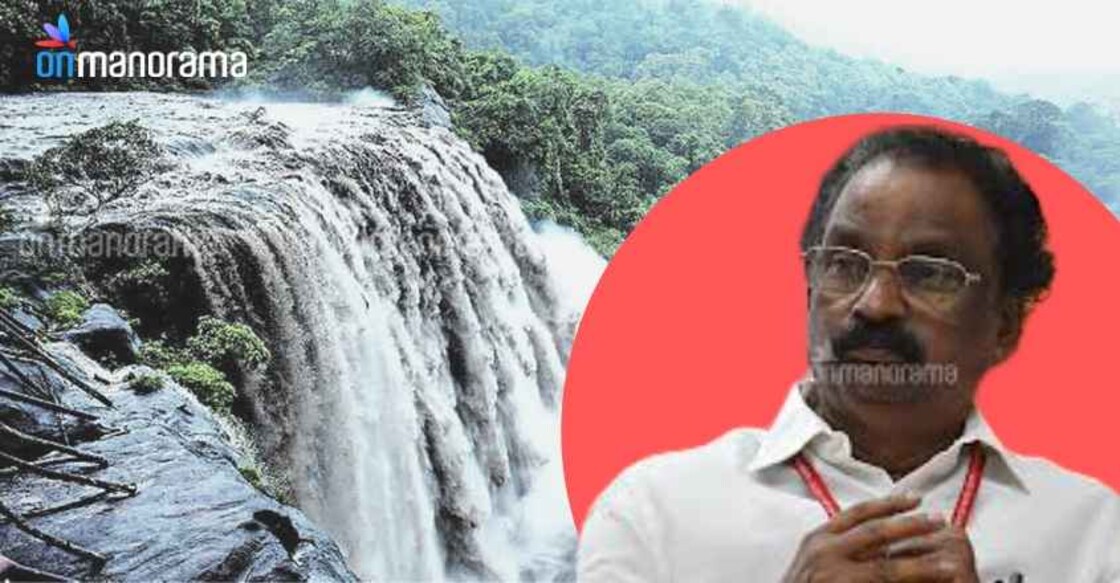‘NOC just a technical matter, no hope for Athirappilly project’

Mail This Article
Editor's Note: A discussion on whether the Athirappilly hydel project could really materialize. Onmanorama presents all the views.
As a proponent of the proposed hydel power project at Athirappilly in Kerala, minister A K Balan has had to lock horns with the then Union minister Jairam Ramesh, environmentalist V S Vijayan and orator Sukumar Azheekode. He led the efforts to make the project a reality as the electricity minister in the V S Achuthanandan government.
Balan, who is also a central committee member of the CPM, speaks to Manorama in the backdrop of a revival of the row after the Pinarayi Vijayan government gave a no-objection certificate (NOC) to the project.
Are you still sticking to the arguments you raised in favour of the Athirappilly power project?
Athirappilly became the most controversial during the period when I was the electricity minister from 2006 to 2011. The party and I were strongly with the argument that we needed the project. There were people who objected to the project in the same cabinet. Even the CPI objected to the project, many CPI leaders have told me that they actually favoured the project. The AITUC was vocal in its support. All the Congress leaders who had handled the electricity portfolio at some point supported the project. Both the central and state governments as well as the agencies set up collectively to vet the project supported it. Still, some people raised illogical objections to the project. I can’t agree with that.
V S Vijayan, who headed the Kerala government’s Biodiversity Board, said the project would affect the ecosystem and threaten the environment.
When Vijayan said that the project would lead to a depletion of fish and there were vulnerable species, I asked him if Athirappilly had any of the 26 species of fish listed as endangered by the International Union for Conservation of Nature (IUCN). He was silent. We had incorporated a project to conserve the majesty of the waterfalls. Of course, we would have to cut some trees but they would not have affected the forest in any way.
We hear a lot of arguments from around the world that hydroelectric projects should be decommissioned.
V S Vijayan has said that he would have objected to even the Idukki power project if his voice carried enough weight. When you say decommission, it means to dismantle the dam. All that water will just drain into the sea. Should we destroy a dam that helps us to store drinking water, irrigate the land, conserve forest and generate cheap electricity or let it stay?
As a minister, you are responsible for the affairs of the tribespeople. Aren’t you concerned about the apprehensions of the Kadar community?
The Athirappilly project will not affect a single tribesman. I had visited the tribal communities at Pukalappara and Vazhachal during my previous term as a minister. There are no tribals in the project area. Those communities will not be affected by the rise in the water level. Yet we had decided to be extra cautious by resettling them and providing employment to them. None of the local people bothered to block my visit. Detractors had to bring tribal people from some other colonies to protest. I told Sukumar Azheekode that I would not mind blasting the dam if it were to affect the tribal people. He told me to convince the people.
Your former cabinet colleague Binoy Viswam’s arguments are received well in society.
My son once teased me that I would have planted trees in the middle of the national highway if I were the environment minister. I am a greater environmentalist that Binoy. When I was the electricity minister, we launched three hydel power projects – Vilangad, Chathankott Nada and Poozhithode – in his home constituency of Nadapuram. During the commissioning of the project at Poozhithode, I asked him if the trees cut for the project were any different from those in Athirappilly. I heard him objecting to being called a ‘CPM leader’ during a TV debate. He refused to debate unless the description was corrected. Did he really have to go to that extent?
Are you saying that the objections raised by former Union environment minister Jairam Ramesh and environmental scientist Madhav Gadgil are baseless?
The withdrawal of environmental clearance by Jairam Ramesh led to an open conflict between us. I told him that he had no right to cancel a clearance given by his own department. He even wrote that then principal secretary to the prime minister, T K A Nair, was also against the project, to back up his stand. Yet the joint secretary wrote in the file that the minister had no right to cancel the clearance. Jairam Ramesh could not get the report he wanted to see even after he set up an expert committee that included V S Vijayan. The matter was later referred to Gadgil. He only went to Athirappilly to prepare a report on the conservation of the Western Ghats. Though Gadgil objected to the project, Kasturirangan said it could be implemented with certain conditions.
Experts have said that the project, which could be worth Rs 1,500 crore, would not be profitable.
We had expected a cost of Rs 400 crore in 2001. Now it may have shot up to Rs 1,500 crore. Though initially incurring losses, the 163-megawatt project would be breakeven after 10-12 years.
Why didn’t the CPM think it fit to consult alliance partner CPI or their representatives in the cabinet before renewing the NOC?
When the CPM supported the project in principle and in practice, the CPI is opposed to it in principle and in practice. The government has made it clear that the project would not be executed unilaterally. Renewing the NOC is a routine department-level work to avoid complications if and when the project is granted all clearances. It was not a policy decision. So it did not have to be debated in the alliance or the cabinet.
The CPM is staunchly in favour of the project even after two devastating floods.
I no longer subscribe to my earlier stand that we should go ahead with the Athirappilly project. We have an agreement in place to buy 850 megawatts of electricity for 25 years. We will get 400 megawatts of electricity from Koodamkulam under any circumstances. Kerala is no longer staring at a power crisis. Though the CPM had vowed to execute the project at any cost, it backtracked on the basis of a consensus formed in the coalition. The party will not take any decision without considering the public opinion and environmental impact, particularly in the backdrop of the threats posed by flood and Covid-19. See how we have resolved to live with a deadly virus. We would have been forced to think about the Athirappilly project if load shedding were recurring.
Do you think the project could become a reality?
I am not hopeful but I can’t agree to the branding of decision-makers as corrupt and advocates of corporate interests while they are taking a decision for the collective good. If a political party’s opinions are more valuable than that of the agencies and departments which are supposed to give clearances for a project, why not disband those departments and agencies?


